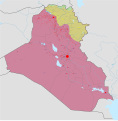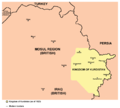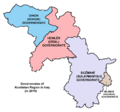Portal:Kurdistan
The Kurdistan Portal Kurdistan (Kurdish: کوردستان, romanized: Kurdistan, lit. 'land of the Kurds'; [ˌkʊɾdɪˈstɑːn] ⓘ), or Greater Kurdistan, is a roughly defined geo-cultural region in West Asia wherein the Kurds form a prominent majority population and the Kurdish culture, languages, and national identity have historically been based. Geographically, Kurdistan roughly encompasses the northwestern Zagros and the eastern Taurus mountain ranges. Kurdistan generally comprises the following four regions: southeastern Turkey (Northern Kurdistan), northern Iraq (Southern Kurdistan), northwestern Iran (Eastern Kurdistan), and northern Syria (Western Kurdistan). Some definitions also include parts of southern Transcaucasia. Certain Kurdish nationalist organizations seek to create an independent nation state consisting of some or all of these areas with a Kurdish majority, while others campaign for greater autonomy within the existing national boundaries. Though, the delineation of the region remains disputed and varied, with some maps greatly exaggerating its boundaries. Historically, the word "Kurdistan" is first attested in 11th century Seljuk chronicles. Many disparate Kurdish dynasties, emirates, principalities, and chiefdoms were established from the 8th to 19th centuries. Administratively, the 20th century saw the establishment of the short-lived areas of the Kurdish state (1918–1919), Kingdom of Kurdistan (1921–1924), Kurdistansky Uyezd i.e. "Red Kurdistan" (1923–1929), Republic of Ararat (1927–1930), and Republic of Mahabad (1946). Iraqi Kurdistan first gained autonomous status in a 1970 agreement with the Iraqi government, and its status was re-confirmed as the autonomous Kurdistan Region within the federal Iraqi republic in 2005. There is also a Kurdistan Province in Iran, which is not self-ruled. Kurds fighting in the Syrian Civil War were able to take control of large sections of northern Syria and establish self-governing regions in an Autonomous Administration of North and East Syria (commonly called Rojava), where they seek autonomy in a federal Syria after the war. (Full article...) Selected article -The Great Zab or Upper Zab (Arabic: الزَّاب الْكَبِيْر, romanized: ez-Zâb el-Kebîr; Kurdish: Zêy Badînan or Zêyê Mezin; Turkish: Zap; Syriac: ܙܒܐ ܥܠܝܐ, romanized: zāba ʻalya) is an approximately 400-kilometre (250 mi) long river flowing through Turkey and Iraq. It rises in Turkey near Lake Van and joins the Tigris in Iraq south of Mosul. During its course, the river collects water from many tributaries and the drainage basin of the Great Zab covers approximately 40,300 square kilometres (15,600 sq mi). The river and its tributaries are primarily fed by rainfall and snowmelt – as a result of which discharge fluctuates highly throughout the year. At least six dams have been planned on the Great Zab and its tributaries, but construction of only one, the Bekhme Dam, has commenced but was halted after the Gulf War. The Zagros Mountains have been occupied since at least the Lower Palaeolithic, and Neanderthal occupation of the Great Zab basin has been testified at the archaeological site of Shanidar Cave. Historical records for the region are available from the end of the third millennium BCE onward. In the Neo-Assyrian period, the Great Zab provided water for irrigation for the lands around the capital city of Nimrud. The Battle of the Zab – which ended the Umayyad Caliphate – took place near a tributary of the Great Zab, and the valleys of the river provided shelter for refugees from the Mongol conquest of Iraq. During the 19th and 20th centuries, the Great Zab basin saw frequent uprisings of local Kurdish tribes striving for autonomy. (Full article...)General images -The following are images from various Kurdistan-related articles on Wikipedia.
Related portals'Religions in Kurdistan Arab states Other countries Selected picture Ruins at the location of old city of Van
Did you know
CategoriesTopicsNew articlesThis list was generated from these rules. Questions and feedback are always welcome! The search is being run daily with the most recent ~14 days of results. Note: Some articles may not be relevant to this project.
Rules | Match log | Results page (for watching) | Last updated: 2024-04-27 20:42 (UTC) Note: The list display can now be customized by each user. See List display personalization for details.
Things you can do
Associated WikimediaThe following Wikimedia Foundation sister projects provide more on this subject:
Sources
Discover Wikipedia using portals |









































